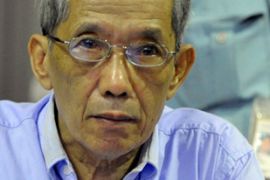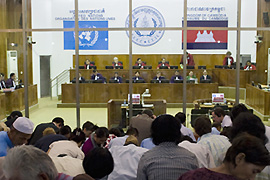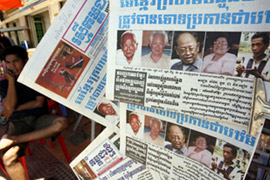Khmer Rouge ‘torturer’ faces court
Prison chief is first member of regime to face war crimes charges at UN-backed court.

‘Seeking justice’
“This is the day we have waited for for 30 years,” said Vann Nath, 63, one of a handful of survivors from S-21 where “enemies of the revolution” were tortured and killed as part of what became known as Cambodia’s “Killing Fields”.
| IN DEPTH |
|
Video: |
Shielded by a bullet-proof screen, Duch did not speak throughout the court’s opening session to hear initial proceedings.
His appearance marked the start of the first-ever war crimes trial of a Khmer Rouge leader, 30 years after the fall of the regime. He faces life imprisonment if convicted.
Selina Downes, Al Jazeera’s correspondent, reporting from Phnom Penh, said: “There was an air of anticipation and expectation that something significant was taking place, as survivors, victims families, the world’s media and human rights groups shared space inside and outside the court.
“Some witnesses … are seeking justice – many people here want answers to questions that remain.”
Duch had been driven to the court from a nearby villa where he is being held with four other Khmer Rouge leaders, who will each face trial later this year.
This week’s hearings will lay the groundwork for a full-blown trial in March, when Duch and survivors are expected to testify.
Significant trial
Duch’s trial is a momentous event in a country where about a fifth of the country’s population died from starvation, disease or execution during the Khmer Rouge’s rule.
 |
| Hundreds of survivors of the Khmer Rouge watched the trial begin [AFP] |
The trial is being carried live on Cambodian television, although the first witness is not expected to be called for several weeks. A verdict is not expected before September.
Duch has expressed regret for his actions and asked forgiveness from his victims but has also said he was only following orders from his superiors.
After the fall of the Khmer Rouge, Duch disappeared for 20 years living under aliases and converting to Christianity before he was located in northwestern Cambodia by Nic Dunlop, a British journalist, in 1999.
‘All prisoners killed’
Theary Seng, an executive director of Cambodia’s Centre for Social Development, was among those who were imprisoned during the rule of the Khmer Rouge, told Al Jazeera: “I remember most clearly the time I was in prison; I was seven years old. We were in prison for five months.”
| Your Views |
|
Is the start of the Khmer Rouge trials justice too late? Send us your views |
“We were detained in the eastern zone where many, many purges were taking place.
“All the prisoners were killed except for my brother and I. We were children. For whatever inexplicable reason, they wanted to save the children and preserve us.”
Duch’s testimony is expected to be vital in securing the convictions of the four other Khmer Rouge leaders awaiting trial before the tribunal.
The group includes Nuon Chea, the group’s former deputy leader also known as Brother Number Two; Khieu Samphan, the former Khmer Rouge head of state; Ieng Sary, the former foreign minister; and his wife Ieng Thirith, who was the social affairs minister.
All have denied committing crimes.
Corruption alleged
Pol Pot, the group’s former supreme leader and Brother Number One, died in a jungle hideout in 1998.
 |
| Ordinary Cambodians have long awaited justice over the mass killings of civilians [Reuters] |
The joint war crimes tribunal, established in 2006 after nearly a decade of negotiations between Cambodia and the UN, is seen as the final chance for Cambodians to see justice done for the Khmer Rouge’s atrocities.
But the run-up to the trial has been marred by claims that the government has interfered to stop the prosecution of other suspects and allegations that Cambodian court staff were paid bribes.
Sara Colm, a Cambodia-based senior researcher at Human Rights Watch, said: “Until allegations of corruption and improper interference by the government are investigated and resolved, the tribunal’s integrity as a legitimate and independent court will remain in question.”
The S21 prison, a former high school, has been converted into a museum of the atrocities committed by the Khmer Rouge.
